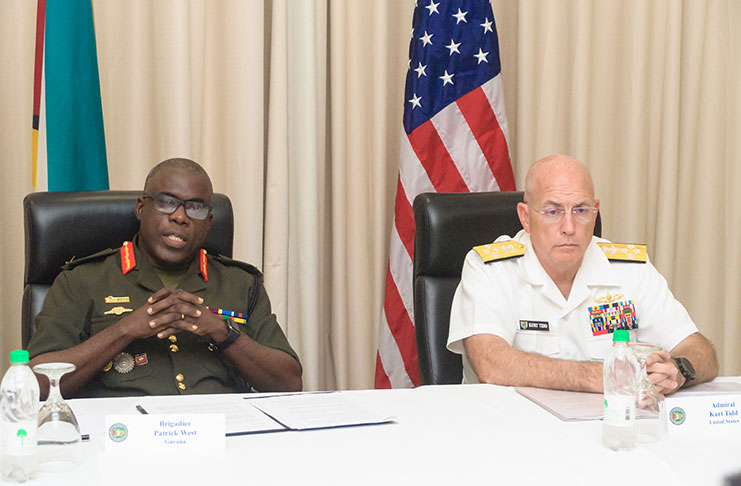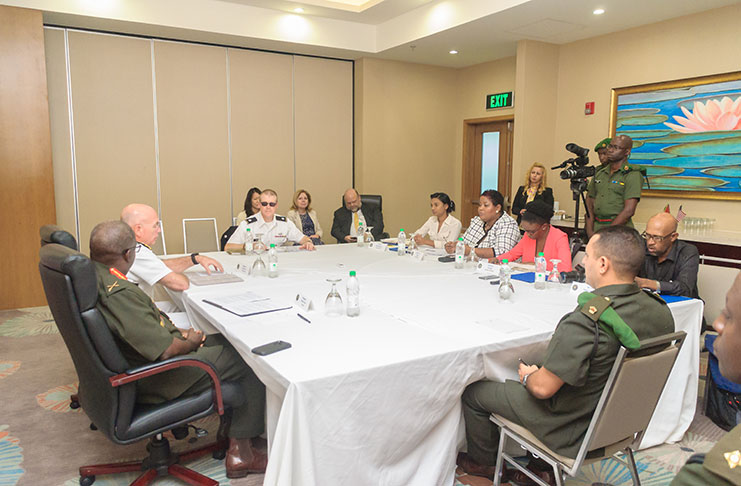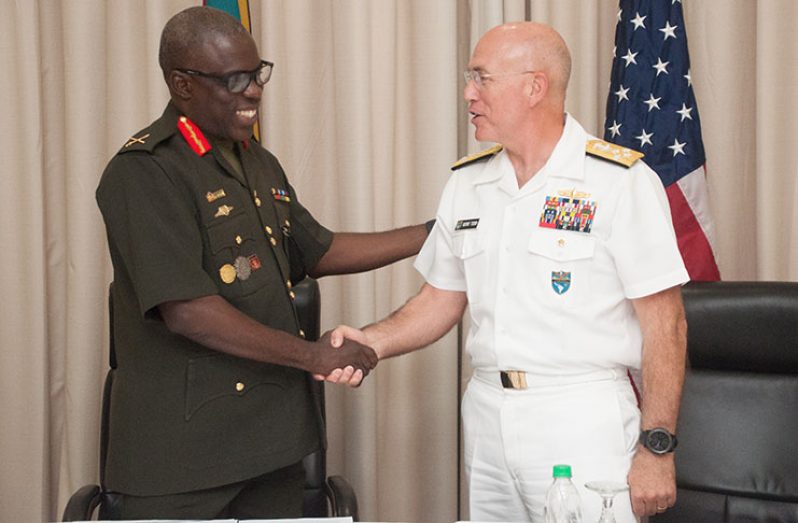— should be involved in detecting, eliminating illicit activities, says US commander
THE military has a role to play in strengthening regional security and as such, focus must be holistically and collectively placed on detecting and eliminating illicit activities.
Commander, United States Southern Command (SOUTHCOM), Admiral Kurt Tidd who was in Guyana to participate in the 16th annual Caribbean Nations Security Conference (CANSEC), in response to questions posed by Guyana Chronicle, Thursday said he believes that the evolution of networks is critical to strengthening regional security.
Asked to explain the concept of evolving networks within that framework, Admiral Tidd said, for years, focus on illicit activities has been done mainly by the police or law enforcement agencies and with little or no military involvement.

As such, the law enforcement agencies found themselves focusing on individual causes as opposed to a chain of activities. The time is now ripe for change in this regard, he posited.
“For a long time there has been a tendency for us to focus on individual illicit commodities, illicit activities whether smuggling of drugs, people, illegal mining, smuggling of gold, and that focused our attention and that tended to draw us into a narrow line of investigation,” he explained.
As a result, the security conglomerate comprising 120 top security officials from 20 nations over the past two days, deliberated upon ways to reduce and ultimately eradicate illicit activities and networks within this hemisphere.
“What we found in the networks as opposed to the individual commodities, is that networks would be involved in whatever was making money and there would be an overlapse where enablers for this illicit activity, whether money launderers, document forgers, skilled in illicit movement, smuggling in anything for the right price [and] that allowed us to pool our efforts in ways that made much more sense,” Admiral Tidd explained.
Seated in the presence of Chief-of-Staff of the Guyana Defence Force (GDF) Brigadier Patrick West, the SouthCom related that more often than not, when there is focus on one specific area, only members of the Police Force or law enforcement organisations are involved.
VALID ROLE
“Whereas, when you look the threat networks there is a very valid role for military to play in the detection of the networks, elimination of those networks,” the Admiral noted.
Additionally, he believes that when illicit networks are disrupted, that is when the law enforcement agencies come into play “We recognise in our hemisphere that the ultimate step of disruption is almost always going to be a law enforcement activity”.

“It might be a part of nation law enforcement activity, it may be our federal law enforcement activity working through our embassies, but ultimately to make them more effective, because they lack capacity, we can play a very useful role because of our expertise in detecting and eliminating networks and exchanging information via military to military basis.”
Moreover, Admiral Tidd said too that by creating broad friendly networks as much as possible, the military has the ability to see, understand and detect criminal elements which in effect would allow for applying pressure more holistically.
“Ultimately, it is going to take that holistic application of pressure rather than if we squeeze in one place, it would just pop up again someplace else… We have to be able to squeeze across the entire region, across these multiple intersecting illicit networks if we are going to be able to take the resources available to us and apply them effectively as our populations expect us to,” he asserted.
That aside, Admiral Tidd said the fact that CANSEC was held for the first time in Guyana and moreover, South America, reflects the increasing trans-national and trans-regional nature of the region’s shared security challenges.
Those challenges include national disasters and threat networks, he told reporters at a media roundtable discourse held at the conclusion of the two-day conference.
COLLABORATION
“Deepening our cooperation requires the collaboration of military and security leaders,” is critical, he stated while noting the need to continue building a professional, inclusive security force that is required to meet today’s complex security challenges.
Tidd explained that as the conference concluded, participants agreed on the need for a shared understanding of the security environment, including the interception of threat networks and disasters and the potential destabilising effects of foreign territory fighters returning to this hemisphere.
“We agreed to improve our common understanding in the security environment and to strengthen our regional networks by increasing our regional sharing. Dialogue like this helps to strengthen trust and collaboration as we implement our shared commitments to regional security and stability,” Admiral Tidd told reporters.
When asked to speak specifically to the increasing threat of cyber-crime, he said the matter was discussed at the two-day caucus and it was recognised as a “new domain that actors are beginning to cooperate in”.
He said it is essential that stakeholders unite and exchange best practices in a bid to curb the criminal activity.
“…Come together to exchange best practices, to understand how we can defend our network,” he stated.
The US Admiral noted that while a schedule has not yet been set, efforts are in train to have programmes established to target cyber-crimes.
“Every country has critical cyber infrastructure that we are all interested in protecting,” he stated.
Meanwhile, in brief remarks Brigadier West told reporters that given Guyana’s geography and history, the country sits at a “critical point of linkage for South America and the Caribbean”.
Guyana, he said, is in a unique place which he said can be a bridge for cooperation for both the Caribbean and South America.
“To be able to mitigate the threats that are posed by organised criminal activities, Guyana has worked and has been working to stem the tide of illegal activities occurring across our borders over the years, and we had testimony of our successes over the last few months or so,” boasted Brigadier West.
He believes that with continued collaboration, there will be many more success stories.
“I hope in the near future you will actually see the fruits of those relationships as we work together with our renewed vigour of the established networks to counter the threats which are posed against our region,” the chief-of-staff stated.
Themed, “Unifying regional action to counter trans-regional and transnational threat networks,” CANSEC serves as a forum for dialogue among chiefs of defence and public security ministers to examine threats to Caribbean stability and evaluate ideas to improve collaboration in support of regional security.
The conference, held at the Marriott Hotel focused on transnational threat networks, regional security strategy, disaster response and emergency management.
CANSEC, sponsored by the SOUTHCOM, was last hosted by Puerto Rico. Also present at the roundtable discourse was U.S. Ambassador to Guyana, Perry Holloway and other senior US Embassy officials and military officials from Guyana and the U.S.




.png)









